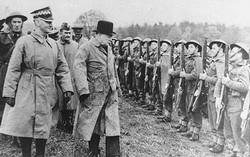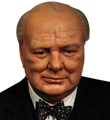Winston Churchill War
|
| updated |
Copy Link Code
|
 Because he was the Prime Minister of Britain from 1940-1945, Winston Churchill and World War II go hand in hand. Having previously fallen out of favor with his colleagues in Parliament, many were surprised to hear that Churchill had been appointed First Lord of the Admiralty (as he was during World War I) on September 3, 1939. Only a few months later, following the resignation of PM Chamberlain and Lord Halifax turning down the position, on May 10, 1940 Churchill was asked by King George VI to be prime minister.
Because he was the Prime Minister of Britain from 1940-1945, Winston Churchill and World War II go hand in hand. Having previously fallen out of favor with his colleagues in Parliament, many were surprised to hear that Churchill had been appointed First Lord of the Admiralty (as he was during World War I) on September 3, 1939. Only a few months later, following the resignation of PM Chamberlain and Lord Halifax turning down the position, on May 10, 1940 Churchill was asked by King George VI to be prime minister.
As the war began, many in both politics and the public felt the best solution was a peace negotiation. But Churchill adamantly refused, keeping private his belief that Britain had little chance to win, while simultaneously inciting resistance in the British people. He also gave a speech in Parliament on June 18 – his infamous "finest hour" speech – to inspire his colleagues' support, calling the war the Battle of Britain. During this time, he gave several famous speeches including the "so much owed by so many to so few" speech, referring to the RAF.
During the war, Churchill maintained a surprisingly effective relationship with Franklin D. Roosevelt, President of the United States at the time. As a result, Britain was able to utilize the North Atlantic shipping routes and obtain the food, oil and munitions that were so vital. Actually, because their relationship was so secure, when FDR was re-elected in 1940, he put a new method in place, which would allow Britain to get needed military hardware and shipping without payment. Having convinced Congress that repayment for such an outrageously expensive service would be given in 'trade' (defense of the U.S. by Britain), the idea of Lend-lease had come to fruition. Following FDR, Harry Truman also became a great ally of Churchill, with Winston publicly offering his admiration and respect for the president.
Despite some close calls, regarding his health – a mild heart attack in December 1941 while he was at the White House, and pneumonia in December 1943 – Churchill continually travelled throughout the entire war. Racking up more than 100,000 miles of travel, he was always on the move, meeting with other national leaders to negotiate treaties, ask for (and offer) support, and plan strategies. As early as 1943, he was party to discussions about redrawing European and Asian boundaries, after the war. With FDR, he drafted a plan that, following surrender, would turn Germany into nothing more than an agricultural, pastoral country.
Winston Churchill during World War II was nothing, if not a beautiful dichotomy. On one hand, he was firmly grounded and focused on Britain's needs, while on the other, he was unpredictable and sometimes downright perplexing. His own Chief of the Imperial General Staff, Alan Brooke, wrote in his diary September 10, 1944: "Without him England was lost for a certainty, with him England has been on the verge of disaster time and again...Never have I admired and despised a man simultaneously to the same extent. Never have such opposite extremes been combined in the same human being."
